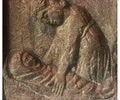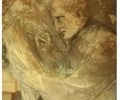Slaves, Freedmen and Patronage
0.0(0)
Card Sorting
1/30
Earn XP
Description and Tags
Last updated 5:46 PM on 3/30/23
Name | Mastery | Learn | Test | Matching | Spaced | Call with Kai |
|---|
No analytics yet
Send a link to your students to track their progress
31 Terms
1
New cards
How did one become a slave?
- Born a slave
- Captives of war
- Kidnapping by pirates
- Convicted criminals
- Captives of war
- Kidnapping by pirates
- Convicted criminals
2
New cards
What were the three types of slave?
Domestic, industrial and public
3
New cards
What did male domestic slaves do?
- Work for the paterfamilias
- do his accounts
- run errands
- accompany him to the baths
- accompany children to school
- entertainers (musicians, actors etc)
- do his accounts
- run errands
- accompany him to the baths
- accompany children to school
- entertainers (musicians, actors etc)
4
New cards
What did female domestic slaves do?
- childcare
- cooking
- cleaning
- weaving
- shopping
- entertainment (dancing)
- cooking
- cleaning
- weaving
- shopping
- entertainment (dancing)

5
New cards
What did industrial slaves do?
Working in:
- mines
- factories
- farming estates (shepherds and cowherds)
- rowers on galleys
- bought for training as gladiators
- mines
- factories
- farming estates (shepherds and cowherds)
- rowers on galleys
- bought for training as gladiators
6
New cards
What did public slaves do?
Upkeep of:
- temples
- baths
- public buildings
- temples
- baths
- public buildings
7
New cards
What else could public slaves do?
Public construction, maintenance projects on roads, aqueducts

8
New cards
What could educated public slaves do?
Work as scribes in Roman civil service

9
New cards
How much power did the master have?
LOTS - power over life and death of the slave
10
New cards
What did masters do to stop their slaves from running away?
Branded them
Metal identification collars
Metal identification collars
11
New cards
What rights did slaves have?
None - no legal or political rights
Could not marry or own property
Could not marry or own property
12
New cards
Did masters always treat slaves badly?
Some masters were brutal but others were kind. Common sense usually prevented a master from treating slaves too harshly as well-cared for slaves would work better; a skilled slave was expensive to replace.
13
New cards
Were slaves allowed to leave the house?
Yes, they moved without restriction about towns, went shopping, visited temples and were quite often present at the theatre and amphitheatre.
14
New cards
How did one become a freedman?
- if slaves earned enough they could buy their freedom
- master might choose to free a slave
- master might choose to free a slave
15
New cards
Why might a master free their slave?
- if they were too old to work
- as a reward for loyal service
- sign of friendship / respect
- as a reward for loyal service
- sign of friendship / respect
16
New cards
How could a master free his slave?
- in a will
- through a manumission ceremony
- announcing it in front of a group of friends
- inviting a slave to recline on the couch at dinner
- through a manumission ceremony
- announcing it in front of a group of friends
- inviting a slave to recline on the couch at dinner
17
New cards
What happened during manumission?
- took place in front of a public official like a judge
- a witness claimed the slave did not really belong to the master
- the master did not deny the claim
- the slave's head was touched with a rod
- slaves would often wear felt caps
- a witness claimed the slave did not really belong to the master
- the master did not deny the claim
- the slave's head was touched with a rod
- slaves would often wear felt caps
18
New cards
What was a libertus?
A freedman / ex-slave. They were now classed as a Roman citizen (male only)
19
New cards
What could they still not do?
Run for public office or become a high ranking officer in the army.
20
New cards
What could their children do?
Have full rights of citizenship!
21
New cards
How was the libertus attached to his master?
As a client
22
New cards
What did this mean he had to do?
- work for him for a number of days each year
- visit him regularly to pay respects
- help and support his master (e.g. at elections)
- visit him regularly to pay respects
- help and support his master (e.g. at elections)
23
New cards
How was the connection between a libertus and his former master clearly seen?
The libertus would take some of the names of his former master.
24
New cards
What jobs would a freedman have done?
They might:
- do the same work they had done as slaves
- be set up in business by their ex-master
- become priests in temples
- become servants of the towns (council secretaries, messengers, town clerk and town crier were all probably freedmen).
- do the same work they had done as slaves
- be set up in business by their ex-master
- become priests in temples
- become servants of the towns (council secretaries, messengers, town clerk and town crier were all probably freedmen).
25
New cards
What was a patron?
A wealthier Roman who supported poorer ones
26
New cards
What was a client?
A poorer Roman / freedman who would be supported by a patron.
27
New cards
When would a client visit his patron?
Early in the morning (1st and 2nd hours) during the salutatio
28
New cards
What would a client hope to receive?
- a sportula - previously a little basket of food but gradually became money. The standard amount was 6.25 sesterces.
Also possibly:
- legal advice / speak on his behalf in court
- presents
- employment
- an invitation to dinner
Also possibly:
- legal advice / speak on his behalf in court
- presents
- employment
- an invitation to dinner
29
New cards
What was expected of a client during a salutatio?
- wear a toga
- address his patron as domine
- perform errands
- accompany him to the forum on official business
- witness signing of legal document
- lead the applause if he made a public speech
- address his patron as domine
- perform errands
- accompany him to the forum on official business
- witness signing of legal document
- lead the applause if he made a public speech
30
New cards
What were the advantages of the patronage system?
For a client:
- No state assistance, so a patron might be his main support
- Help him climb up in society
- Find better jobs
For a patron:
- Able to call on the services of his clients
- Good for prestige and status to have lots of clients
- No state assistance, so a patron might be his main support
- Help him climb up in society
- Find better jobs
For a patron:
- Able to call on the services of his clients
- Good for prestige and status to have lots of clients
31
New cards
What were the disadvantages of being a client
* Tasks could be boring and time-consuming
* Clients at dinner parties sometimes complained they got poorer quality food and drink
* 'How much longer have I got to turn up to these early-morning buttering-up sessions, mingling with the mob of followers and little men all done up in their posh togas? And for what? A handful of brass for a full day's work.' Martial, Epigrams
* You order me to perform for you the duties of a new and recent friend, Fabianus; that at first light, shivering, I should greet you and that your litter should drag me through the middle of the mud; that when I am worn out, I should follow you at the tenth hour or later to the baths of Agrippa ... Is this what I have deserved, Fabianus, that, when my toga is threadbare, you think I have not yet earned my discharge?
* Clients at dinner parties sometimes complained they got poorer quality food and drink
* 'How much longer have I got to turn up to these early-morning buttering-up sessions, mingling with the mob of followers and little men all done up in their posh togas? And for what? A handful of brass for a full day's work.' Martial, Epigrams
* You order me to perform for you the duties of a new and recent friend, Fabianus; that at first light, shivering, I should greet you and that your litter should drag me through the middle of the mud; that when I am worn out, I should follow you at the tenth hour or later to the baths of Agrippa ... Is this what I have deserved, Fabianus, that, when my toga is threadbare, you think I have not yet earned my discharge?